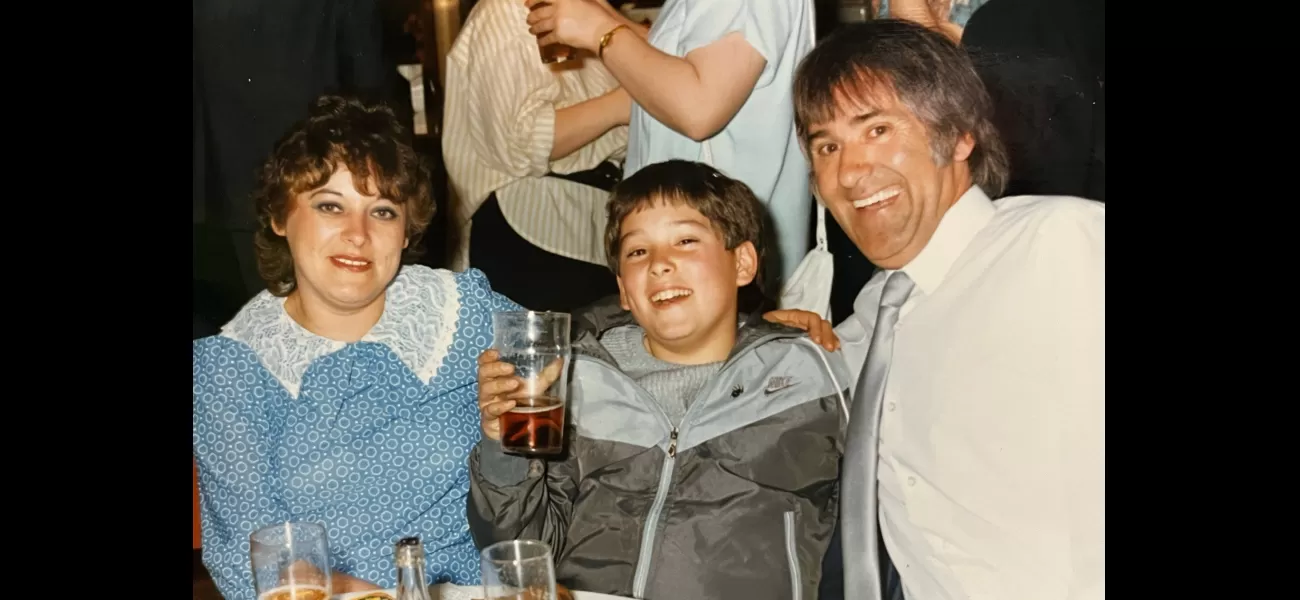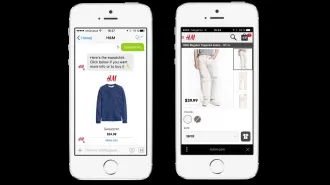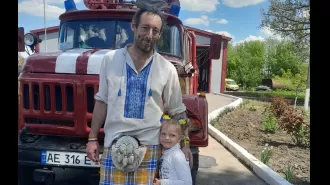A father's life was taken by the infected blood tragedy, robbing his child of a normal life.
Nothing can bring my dad back, no matter how much they apologize or try to make it right.
May 22nd 2024.

Growing up, my dad's haemophilia always meant that we couldn't do certain things together, like play football, run around, or wrestle. It was a rare condition that affected his blood's ability to clot, making him prone to internal bleeds and joint pain. Instead, we found other activities to bond over, like snooker and DIY projects around the house.
But everything changed when I was 15 years old and my mum uttered the words that would turn my world upside down: "Dad's dying of AIDS." I was completely shocked and devastated. I ran upstairs and couldn't hold back the wave of emotions that overcame me. I threw up in the sink, unable to process the news.
It was 1989, and just under seven weeks later, my 48-year-old dad passed away. It wasn't until much later, around 25 years later, that I fully understood the magnitude of his story and how it was part of a much bigger one. He was one of the estimated 30,000 people in the UK who had been infected with HIV and/or hepatitis from contaminated blood products in the 1970s and 80s. This was known as the infected blood scandal.
This week, after years of fighting for justice, the victims of this medical treatment scandal finally received an apology from the government. This was a significant step, and there's also the promise of compensation. But for me, it's bittersweet. My dad tested positive for HIV in 1985 after being treated with a blood product called Factor VIII, which was meant to help his blood to clot. It wasn't until the winter of 1987 when he developed pneumonia that we realized his condition had progressed to full-blown AIDS.
My parents did everything they could to hide his diagnosis from me, even taking the labels off his pills in the kitchen drawer. Looking back, I'm grateful that they tried to protect me for as long as possible. But on July 9th, 1989, my dad tried to get up from the sofa and ended up breaking his hip. It was then that my mum knew she had to tell me the truth. My dad was taken to the hospital, and eventually, he was transferred to the Queen Elizabeth Hospital in Birmingham. He never came back home.
I remember a consultant taking my mum and me into a side room and telling us bluntly, "Well, he's dying." It was a harsh reality to face, and six weeks and six days after his first hospitalization, my dad's breathing stopped. I'll never forget the image of his mouth wide open, as if letting out a silent scream, as he took his last breath. Leaving the hospital that day, I felt empty and numb.
My mum's health was never the same after my dad's death. She wasn't infected, but the loss of her husband took a toll on her physical and mental well-being. As a result, our relationship became strained. She passed away at the age of 58 in 2010, 21 years after my dad.
It wasn't until the mid-2010s that I realized my dad's story wasn't an isolated one. Through social media, particularly Twitter, I heard more and more stories about people who had been infected with HIV and/or hepatitis through contaminated blood products. When the inquiry for the infected blood scandal was announced in 2017, I decided to do some digging of my own. That's when I found a medical report confirming my dad's diagnosis for both HIV and hepatitis C, which I had no idea about.
I also found paperwork related to litigation from 1990, which revealed details like when my dad was tested and the batch numbers of the blood products he received. It was settled out of court, and my mum received a payment, which I believe went towards buying our council house. I never considered myself a campaigner, but I was so shocked and outraged by what I uncovered that I started sharing my dad's story on social media.
This week, the long-awaited infected blood inquiry report was released, and it revealed that victims had been failed "not once but repeatedly" by doctors, the NHS, and the government. Prime Minister Rishi Sunak issued a heartfelt apology, but for me, it's too little, too late. It needs to be backed up with action and quickly.
Following the report's publication, the government announced a reported £10 billion in funding for the victims and families affected by this scandal. While I appreciate the financial support, it will never bring my dad back. He never got to see me graduate, get married, or meet his granddaughter. I never had the chance to buy him a pint at the pub or ask for his advice. No amount of money can change the suffering my family and so many others have endured.
I want to pay tribute to the countless people who have campaigned for justice for years, especially those who have been infected or affected by this scandal. I also want to acknowledge the immense efforts of Dame Diana Johnson and Sir Brian Langstaff, who have been instrumental in bringing this issue to light.
But for me, there needs to be accountability. Those responsible for withholding crucial information and making decisions that prioritized the public purse over patient safety should face consequences. This week's developments are not the end of this decades-long scandal, and for those involved, there will never be complete closure.
The apology from the government, along with the promise of financial compensation, allows us to begin to close this painful chapter and move forward with our lives. But it will never bring back my dad. I hope that through this inquiry and the efforts of those who continue to fight for justice, we can prevent something like this from ever happening again.
But everything changed when I was 15 years old and my mum uttered the words that would turn my world upside down: "Dad's dying of AIDS." I was completely shocked and devastated. I ran upstairs and couldn't hold back the wave of emotions that overcame me. I threw up in the sink, unable to process the news.
It was 1989, and just under seven weeks later, my 48-year-old dad passed away. It wasn't until much later, around 25 years later, that I fully understood the magnitude of his story and how it was part of a much bigger one. He was one of the estimated 30,000 people in the UK who had been infected with HIV and/or hepatitis from contaminated blood products in the 1970s and 80s. This was known as the infected blood scandal.
This week, after years of fighting for justice, the victims of this medical treatment scandal finally received an apology from the government. This was a significant step, and there's also the promise of compensation. But for me, it's bittersweet. My dad tested positive for HIV in 1985 after being treated with a blood product called Factor VIII, which was meant to help his blood to clot. It wasn't until the winter of 1987 when he developed pneumonia that we realized his condition had progressed to full-blown AIDS.
My parents did everything they could to hide his diagnosis from me, even taking the labels off his pills in the kitchen drawer. Looking back, I'm grateful that they tried to protect me for as long as possible. But on July 9th, 1989, my dad tried to get up from the sofa and ended up breaking his hip. It was then that my mum knew she had to tell me the truth. My dad was taken to the hospital, and eventually, he was transferred to the Queen Elizabeth Hospital in Birmingham. He never came back home.
I remember a consultant taking my mum and me into a side room and telling us bluntly, "Well, he's dying." It was a harsh reality to face, and six weeks and six days after his first hospitalization, my dad's breathing stopped. I'll never forget the image of his mouth wide open, as if letting out a silent scream, as he took his last breath. Leaving the hospital that day, I felt empty and numb.
My mum's health was never the same after my dad's death. She wasn't infected, but the loss of her husband took a toll on her physical and mental well-being. As a result, our relationship became strained. She passed away at the age of 58 in 2010, 21 years after my dad.
It wasn't until the mid-2010s that I realized my dad's story wasn't an isolated one. Through social media, particularly Twitter, I heard more and more stories about people who had been infected with HIV and/or hepatitis through contaminated blood products. When the inquiry for the infected blood scandal was announced in 2017, I decided to do some digging of my own. That's when I found a medical report confirming my dad's diagnosis for both HIV and hepatitis C, which I had no idea about.
I also found paperwork related to litigation from 1990, which revealed details like when my dad was tested and the batch numbers of the blood products he received. It was settled out of court, and my mum received a payment, which I believe went towards buying our council house. I never considered myself a campaigner, but I was so shocked and outraged by what I uncovered that I started sharing my dad's story on social media.
This week, the long-awaited infected blood inquiry report was released, and it revealed that victims had been failed "not once but repeatedly" by doctors, the NHS, and the government. Prime Minister Rishi Sunak issued a heartfelt apology, but for me, it's too little, too late. It needs to be backed up with action and quickly.
Following the report's publication, the government announced a reported £10 billion in funding for the victims and families affected by this scandal. While I appreciate the financial support, it will never bring my dad back. He never got to see me graduate, get married, or meet his granddaughter. I never had the chance to buy him a pint at the pub or ask for his advice. No amount of money can change the suffering my family and so many others have endured.
I want to pay tribute to the countless people who have campaigned for justice for years, especially those who have been infected or affected by this scandal. I also want to acknowledge the immense efforts of Dame Diana Johnson and Sir Brian Langstaff, who have been instrumental in bringing this issue to light.
But for me, there needs to be accountability. Those responsible for withholding crucial information and making decisions that prioritized the public purse over patient safety should face consequences. This week's developments are not the end of this decades-long scandal, and for those involved, there will never be complete closure.
The apology from the government, along with the promise of financial compensation, allows us to begin to close this painful chapter and move forward with our lives. But it will never bring back my dad. I hope that through this inquiry and the efforts of those who continue to fight for justice, we can prevent something like this from ever happening again.
[This article has been trending online recently and has been generated with AI. Your feed is customized.]
[Generative AI is experimental.]
0
0
Submit Comment





